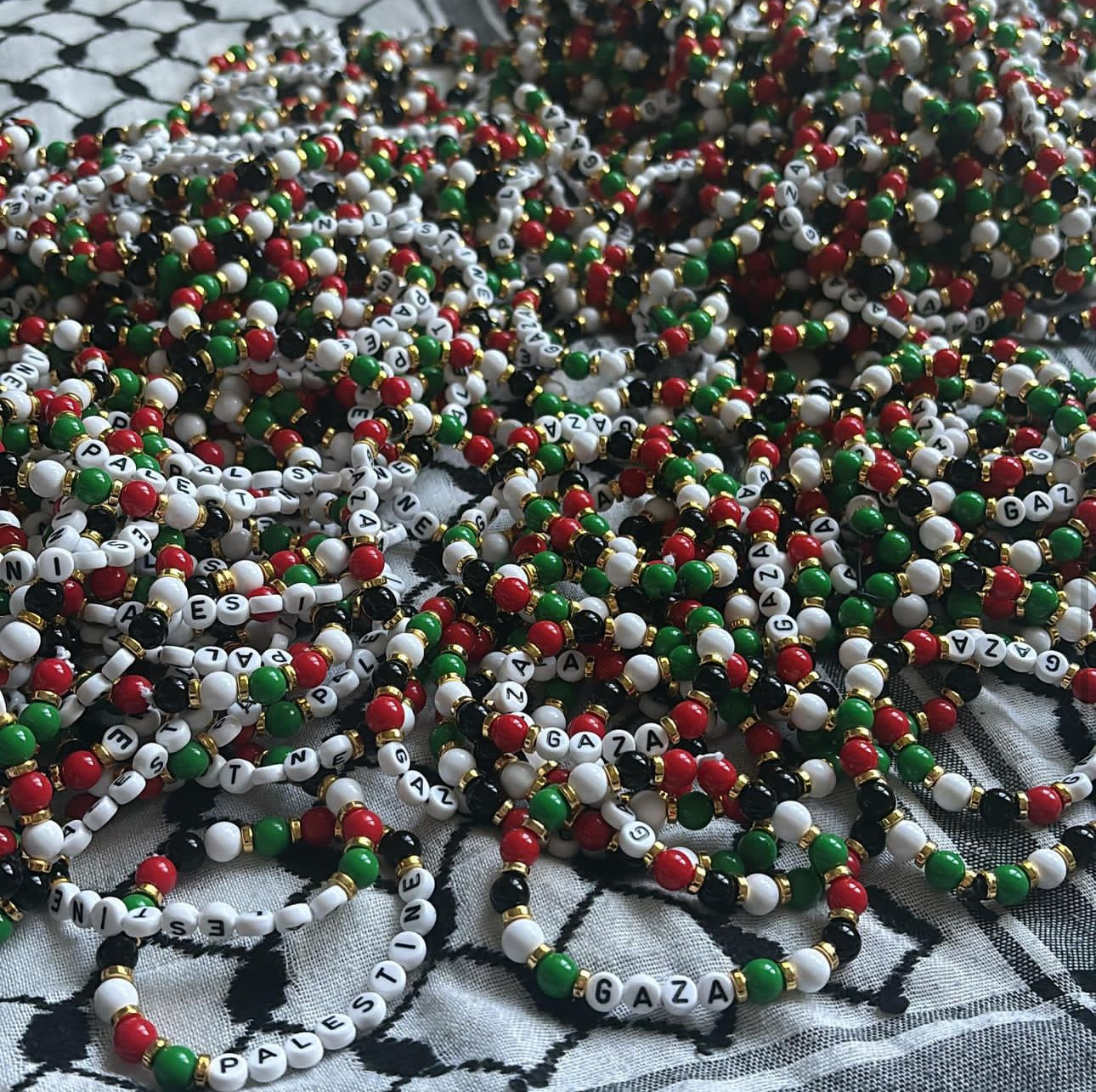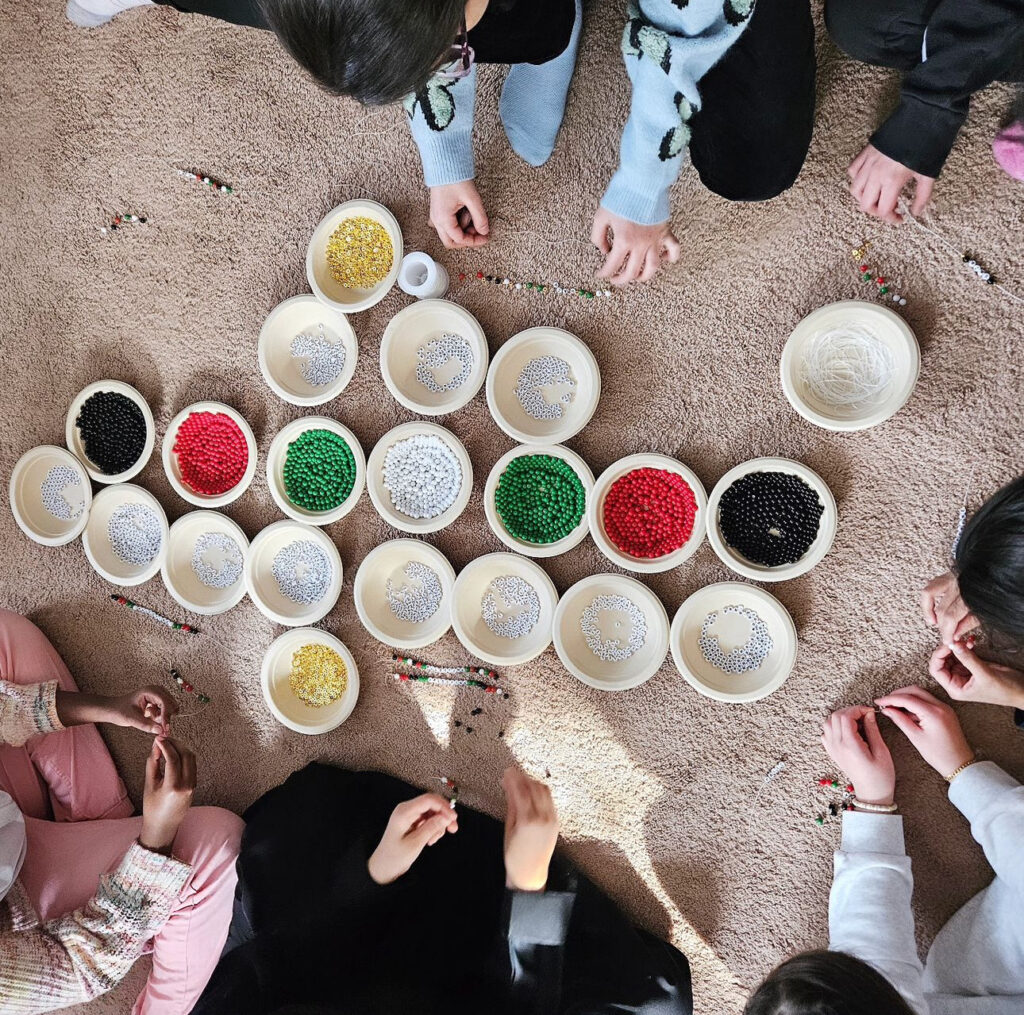Girl Scouts Troop Disbands Over Gaza Fundraiser
By Nayab Bashir
July/Aug 2024

There is an American dream beyond the standard striving for upward mobility. It’s a dream of inclusion and integration, of equity. Perhaps that is what some mothers were looking for when they signed their daughters up for Girl Scouts Troop 149.
The Girl Scouts has long been a coming-of-age rite of passage. One in three women in the U.S. was a Girl Scout at some point in their life. The organization claims to build “girls of courage, confidence, and character, who make the world a better place.” Unfortunately, as of late, some disagree.
This past cookie season, Troop 149 of St. Louis, Mo., wanted to sell bracelets instead of cookies and donate the proceeds to Palestine. Not long after they announced their plans, their parent chapter, the Girl Scouts of Eastern Missouri, aggressively responded with a very clear message that the organization didn’t participate in political and partisan activities: “Girl Scouts of Eastern Missouri and Girl Scouts of the United States have no other choice than to engage our legal counsel to help remedy this situation and to protect the intellectual property and other rights of the organization” (Erum Salam, “Girl Scout troop disbands after parent chapter blocks Palestine fundraiser”, March 5, 20245, The Guardian). Not only was this surprising, but also hypocritical, as other Girl Scout troops had organized to help Ukraine after Russia’s February 2022 invasion. The Girl Scout’s website shows a troop in Ohio awarded one of the organization’s highest recognitions, the Girl Scout Bronze Award, for collecting medical supplies and packing first aid kids, friendship bracelets and cookies to be distributed in Ukraine (www.girlscouts.org/en/site-search.html?q=ukraine).
Hurt and Disappointment
Aside from the fear that accompanies a threat of legal action, the situation was hurtful and triggering for Troop 149’s founder Nawal Abuhamdeh, a Brooklyn-born Palestinian American. The stark contrast of the organization’s response to the Ohioan troop and her own stirred memories of being excluded as a child because of her identity. Both her parents were born in Beit Hanina, a West Bank village on the road connecting Ramallah to al-Quds (Jerusalem). Despite a daily yearning to return to her homeland, Abuhamdeh hasn’t visited her beloved Palestine since 2016. “Palestine is my home, my true love, and I dream of a day I can live there freely,” she states.
A freelance product designer and mother of four, Abuhamadeh has worked with various Islamic nonprofits in St. Louis. She and her husband have dedicated their lives to raising practicing Muslim children who will make a positive difference in the world. “We want to ensure that they have more opportunities as second-generation Muslim Palestinian Americans than we did as the first-generation,” Abuhamadeh said.
“This was one of the reasons behind founding the troop in 2019. My intentions were clear: ‘I wanted our girls to learn the skills they need to be strong, independent community leaders, using their Muslim identity as their superpower.’”
She believes the Girl Scouts’ mission aligned with her values of boosting “girls’ courage, confidence and character.” She feels it’s like following the Prophet’s (salla Allahu ‘alayhi wa sallam) sunnah — to use our values to make the world a better place.
Every year, the troop put in a lot of energy into cookie season, selling about $8,000 worth of them each year. They followed each rule.
But this year was different, for there are no rules and policies when it comes to advocating against a genocide. Thus, the troop decided not to participate in the annual cookie season. “We believe that in times of crisis and hardship, it is crucial to prioritize empathy, compassion and support for those who are suffering,” Abuhamadeh said. “At such a time cookies didn’t feel like the right focus. We couldn’t fathom selling cookies when our brothers and sisters are being forced to starve. We couldn’t sell cookies during a genocide.
“I am no longer going to stay quiet to make other people feel more ‘safe’ or comfortable about my identity. How could anyone see images of children and people in shreds, videos of children being amputated without anesthesia, mothers screaming for their children, children begging for their parents and not do anything about it? It is all horrific. And the worst part is that this is all man-made and our ‘leaders’ are doing nothing about it.”
While the leaders may not be doing much, when the 10-year-olds in troop saw the images, they were in tears and ready for action. They watched “Farha,” – a 2021 internationally co-produced historical drama film about a Palestinian girl’s coming-of-age experience during the Nakba (https://en.wikipedia.org/wiki/Farha_(film)), at a group movie night and followed it with a restorative circle with a mental health specialist where each girl cried and expressed their feelings about what is happening in Palestine. They said they felt guilty for being happy when kids in Gaza are being killed, displaced and injured.
The girls, of Pakistani, Jordanian, Somali and Palestinian heritage, didn’t feel they could be happy selling cookies. They asked if they could sell bracelets instead to raise funds for Gaza. Adults agreed and quickly set their idea in motion.
Girl Scouts Disapproves
It is uncertain how exactly The Girl Scouts of USA found out about the troop’s plans. It was never a secret, as at the time the foundation’s reaction was unexpected.

Before Abuhamadeh could respond to the first email, she had three more in her inbox. She was afraid they may take legal action against her. The message was clear. The email called for immediate removal of all communication, social media posts and reference to the organization in the troop’s efforts, stating clearly that this was not an approved activity. Upset, confused and worried, Abuhamadeh contacted CAIR-Missouri and was asked to “keep them in the loop.”
“I independently responded to them, expressing that this is not political or partisan and how dire the humanitarian crisis is in Gaza.” More than anything, she was disappointed. She exchanged a few emails and texts with CAIR but was told that “they didn’t notice a discrimination case.” Some feel the matter is resolved; however, Abuhamadeh and her troop do not agree.
The troop disbanded because it felt that The Girl Scouts don’t practice what they preach. Prior to this situation, everything their troop had participated in embodied the organization’s values. Abuhamadeh ensured that the meetings and activities were girl-led, that members left each meeting better than they’d come, were honest and fair with each other and the people they were around and made their communities better through their service.
The Girl Scouts no longer holds any appeal for the former troop. “After their long silence, we aren’t expecting them to apologize. We’ve come to accept that, and [it] further makes us feel that we made the right decision to leave Girl Scouts. Their organization isn’t a good fit for us, who we are and the causes we stand for. If you aren’t pro-peace and anti-genocide, we don’t want to be associated with you. We’d prefer to stay on the right side of history.”
After CAIR contacted Girl Scouts, their chief executive, Bonnie Barcykowski wrote that they “were disappointed and disheartened by what recently transpired” and they “recognize the greater clarity and additional education is needed regarding fundraising policies.” Further adding “this is a learning moment for our organization as we realize we can always do better. We know we should always lead with empathy and recognize the incredible need for kindness and compassion during this difficult time, we are also deeply committed to advancing belonging, inclusion, and anti-racism as an organization and within our membership, and we will continue to ensure that we address all communities, including the Muslim and Arab communities. GSUSA will be working alongside our council partners to review this incident and make the necessary adjustments to prevent it from happening in the future. We realize we missed an opportunity to champion our troops while they make a difference.”
Bracelets Bring Big Bucks
The resilient group of girls has moved onward and upward. On their first order form they sold 600 bracelets in two weeks. Once the story hit social media, they sold 2,106 bracelets in less than four days and had to close orders again. They called out to volunteers and were humbled by the response as people from all over southeastern Missouri and southern Illinois joined them to help complete and dispatch orders.
As of early May, the troop has raised over $20,000 for Palestine Children’s Relief Fund.
Abuhamadeh accepted every interview request from all media sources, including STLPR, NBC, Washington Post, The Guardian and more, but refused to interview with FOX for their biased and racist coverage of Gaza. “I wasn’t going to give them an opportunity to slice my interview into being the story that they want to tell, putting me in jeopardy of portraying me in a negative light.”
Her daughter Mariyah Abdelbaset,11 joined her for an interview with NPR. It was an emotional moment for both. “It was my first interview with my daughter, and I was proud of her for using her voice. I was sad to hear her talk about how she doesn’t feel like she could be happy when the kids of Gaza are not. I was thankful that I was given the opportunity to tell our story, amplify the voice of Palestinians and could inspire others to stand up for what is right in the world. It is only when we are united that we can make an impact in the world.”
Unsure of what the future holds, Abuhamadeh and the girls are choosing to focus on the positive and hope to enter the new chapter with excitement and motivation to make a positive difference in the world.
Nayab Bashir is a literature aficionado with an English literature degree to prove it.
Tell us what you thought by joining our Facebook community. You can also send comments and story pitches to horizons@isna.net. Islamic Horizons does not publish unsolicited material.
